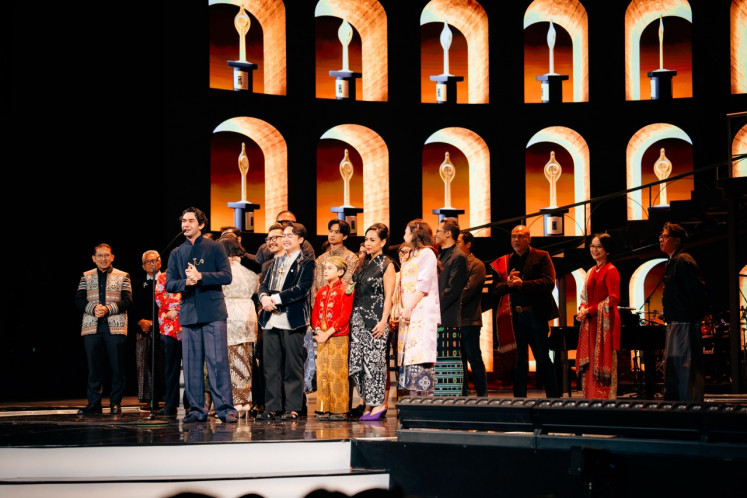Popular Reads
Top Results
Can't find what you're looking for?
View all search resultsPopular Reads
Top Results
Can't find what you're looking for?
View all search resultsEssay: Learning from the Indian diaspora
What comes to your mind when you hear the word “India”?
Change text size
Gift Premium Articles
to Anyone
W
hat comes to your mind when you hear the word “India”? Many are likely to answer Bollywood. Some may think of the distinctive female garment the sari. Others may associate it with its dishes known for their exotic flavors.
Like the Chinese, Indians are spread throughout the world. People can come across them in any area at any time.
Indonesia should learn many things from the Indian diaspora. Not only does their typical distinctiveness show a splendid cultural legacy, more importantly, the Indians of the diaspora are instrumental in setting an example for us, either at home or overseas, to beef up the quality of our human resources on a global scale.
I am of the view that learning from the lives of the Indian diaspora is an attempt to look at ourselves in the mirror, learning from the experience of others or bringing out the best in others. Despite their dynamics, however, the people of the Indian diaspora are strongly rooted in the following forces.
First, international orientation is the key to their existence and identity. It lends color to the Indian education system and way of communication. It is not simply limited to the curriculum at primary, college or university level.
Equally importantly, it also deals with the quality of human resources, instead of spending too much capital on financial resources, on mere physical aspects, such as deluxe university buildings. It is no surprise that many university classrooms in India do not have air-conditioning. Yet Indian students enjoy the best and brightest lectures from Indian professors graduating from the best universities in the United States, United Kingdom and Europe.
The international standard of education has produced India’s best talent, occupying various senior posts around the globe in finance, taxation, medicine, IT and many other fields. Many renowned CEOs in the world’s largest corporations are Indian-born, such as Satya Narayana Nadella of Microsoft and Sundar Pichai of Google.
The amazing thing is that many Indians going abroad do so on a free-fall principle — without scholarships from their government and relying upon their own funds when it comes to seeking jobs overseas.
Besides, their global orientation cannot be separated from their cultural power and English-speaking skills. Indians are noted for being a talkative people, which is their source of confidence. In response to this, I told a joke to my Indian friend, “While it’s hard to get Indonesian students to start speaking in English in a classroom or international forum, it is much more difficult to get Indian students to stop talking in the same venue.”
In terms of English competence, it is public knowledge that Indians speak English better than any other non-English speaking countries.
In Australia, for example, people do not simply meet Indians as bankers, accountants, professionals, researchers, or IT specialists but also as drivers, bakers or call-center officers. They easily access any jobs as they have no problem with English as a tool of communication and service.
Second, Indians are very proud of their culture. They are committed to bringing their own identity into the public space, not only on certain seasons or festivities.
On many occasions, for example, I often come by Indian women wearing their traditional clothes, such as kurta, in the workplace, going shopping and picking up their kids from school. While attending functions outdoors, they continue to listen to Desi songs even though they speak English between them.
This suggests that Indians excel in sustaining a balance between the need to become global citizens and pride in identity. In a multicultural country, a sense of and pride in identity is of paramount significance, as many people — particularly third-generation immigrants — are prone to become detached from their cultural identity, marked by their inability to speak their mother tongue.
In many ways, we have much in common with Indians. The richness of culture, language and culinary arts are the main elements that attract the world community to visit Indonesia.
However, our momentous task is how to build our citizens’ ability to communicate globally through the English language, something we may learn from Indians. The balance between pride in our own culture and globally exploring capabilities through the English language needs to be taken into account as early as possible.
Third, Indians have a high regard for elderly people. This is something serious and readily found among the Indian diaspora. Just visit food courts in shopping malls in Melbourne, Australia, for instance, you will find lots of complete Indian extended families — father, mother, kids and grandparents.
I assumed it was a typical phenomenon of certain multicultural suburbs, like Clayton, Springvale or Bix Hill in Melbourne. My assumption was wrong. They are found in many places mostly inhabited by white people, including in Port Melbourne, Toorak or Brighton. As I asked my Indian friend about this, he replied that Indians highly appreciated and respected their parents. They will not leave their parents at home on their own; in a nutshell, extended family is a precious treasure for the Indian diaspora.
***
The writer is a lecturer at the School of Cultural Sciences, Andalas University in Padang, West Sumatra.











